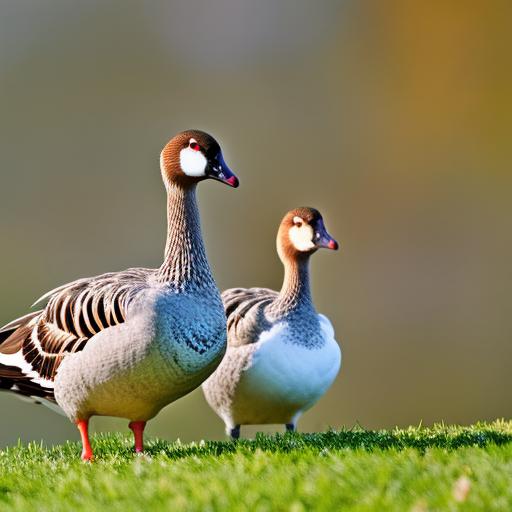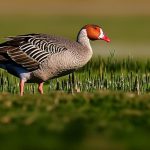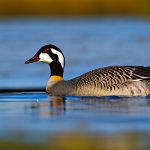Geese are beautiful creatures that can be a delight to watch as they glide across the water or fly in formation overhead. However, when geese start visiting your property in large numbers, they can quickly become a nuisance. Understanding their behavior and finding ways to deter them is essential to maintaining a peaceful and clean environment. In this article, we will explore the behavior of geese, the reasons why they may be attracted to your property, the negative effects they can have, and various methods for deterring them.
Key Takeaways
- Geese are social animals that mate for life and are highly protective of their young.
- Geese may visit your property for food, water, or nesting sites.
- Geese can cause damage to lawns, gardens, and buildings, and their droppings can pose health risks.
- Natural deterrents for geese include planting certain types of vegetation and using decoys of predators or other geese.
- Physical barriers such as fences or netting can be effective in keeping geese out, as well as using sound or visual deterrents.
Understanding the Behavior of Geese
Geese are social birds that typically live in large flocks. They are known for their distinctive honking sound and their V-shaped flight formations. Geese are monogamous and mate for life, returning to the same nesting site year after year. They build their nests on the ground near bodies of water, using grasses and other vegetation to create a comfortable nest for their eggs.
Geese are herbivores and primarily feed on grasses, aquatic plants, and grains. They have a unique digestive system that allows them to extract nutrients from tough plant material. During migration, geese rely on stopover sites to rest and refuel before continuing their journey. These sites often provide abundant food sources, such as agricultural fields or open grassy areas.
Identifying the Reasons for Geese Visiting Your Property
There are several reasons why geese may be attracted to your property. One of the main reasons is the availability of food sources. If you have a well-maintained lawn or open grassy areas, geese may see it as an ideal feeding ground. Additionally, if you have a pond or other body of water on your property, geese may be drawn to it for drinking and bathing.
Another reason geese may visit your property is the presence of shelter. Geese prefer open areas where they can easily spot predators, but they also need areas where they can rest and feel safe. If your property has tall grasses, shrubs, or trees that provide cover, geese may be more likely to visit.
The Negative Effects of Geese on Your Property
While geese may seem harmless, they can actually have several negative effects on your property. One of the most noticeable effects is damage to landscaping. Geese are voracious eaters and can quickly strip a lawn of its grass, leaving behind unsightly patches of dirt. They can also trample plants and flowers, causing further damage to your landscaping.
Another concern with geese is the health hazards they can pose. Geese droppings are not only unsightly but can also carry bacteria and parasites that can be harmful to humans and pets. The accumulation of droppings can also create an unpleasant odor and attract other pests, such as flies.
In addition to the physical damage and health hazards, geese can also create noise pollution. Their constant honking can be disruptive and annoying, especially if you live in close proximity to their nesting or feeding areas.
Natural Deterrents for Geese
If you want to deter geese from your property without causing harm to them, there are several natural deterrents you can try. One method is to plant certain types of vegetation that geese find unappealing. For example, geese dislike plants with prickly leaves or strong odors, such as rosemary or lavender. By incorporating these plants into your landscaping, you may discourage geese from visiting.
Another natural deterrent is the use of decoys. Geese are social birds and are more likely to avoid areas where they see other geese. By placing decoys in strategic locations around your property, you may be able to deter geese from settling in.
Creating Physical Barriers to Keep Geese Out

If natural deterrents are not effective, you may need to consider creating physical barriers to keep geese off your property. One option is to install fencing around areas you want to protect, such as your lawn or garden. Make sure the fence is at least three feet high and has small enough gaps to prevent geese from squeezing through.
Another option is to use netting to cover areas where geese are causing damage. For example, if geese are eating your plants or grass, you can install netting over the affected areas to prevent them from accessing the food source.
Using Sound as a Deterrent for Geese
Sound can be an effective deterrent for geese, as they are sensitive to loud noises and perceive them as a threat. One method is to use loud noises, such as banging pots and pans or setting off fireworks, to scare geese away. However, keep in mind that this method may also disturb your neighbors and other wildlife in the area.
Another option is to use predator calls to mimic the sounds of natural predators, such as coyotes or hawks. Geese are instinctively wary of these predators and will often flee when they hear their calls. There are commercially available devices that emit predator calls, or you can find recordings online and play them through a speaker.
Implementing Visual Deterrents to Keep Geese Away
Visual deterrents can also be effective in deterring geese from your property. One method is to use reflective tape or flags that move in the wind. The flashing light and movement can startle geese and make them feel uncomfortable.
Scarecrows are another visual deterrent that can be effective in keeping geese away. Place scarecrows in areas where geese tend to congregate, such as near water sources or feeding areas. Make sure to move the scarecrows periodically so that geese do not become accustomed to their presence.
Chemical Repellents for Geese
If natural and physical deterrents are not effective, you may need to consider using chemical repellents to keep geese away. There are several commercially available sprays and gels that can be applied to areas where geese are causing problems. These repellents typically contain ingredients that are unpleasant to geese, such as grape extract or methyl anthranilate.
When using chemical repellents, it is important to follow the instructions carefully and avoid applying them near water sources or areas where children or pets may come into contact with them. It is also important to note that chemical repellents may need to be reapplied periodically, especially after rain or heavy watering.
Seeking Professional Help for Geese Control
In some cases, it may be necessary to seek professional help for geese control. This is especially true if you are dealing with a large flock of geese or if your property has persistent problems despite your best efforts. Professional wildlife control companies have the knowledge and experience to effectively deter geese and can provide long-term solutions tailored to your specific situation.
Maintaining a Geese-Free Property
Once you have successfully deterred geese from your property, it is important to maintain a geese-free environment. Regular maintenance is key to preventing geese from returning. Keep your lawn well-maintained and free of excess water or food sources that may attract geese. Remove any debris or clutter that could provide shelter for geese.
It is also important to monitor your property regularly for signs of geese or any damage they may have caused. By catching any potential problems early on, you can take action before the situation becomes more difficult to manage.
Geese can be a beautiful addition to any landscape, but when they start causing damage and creating a nuisance, it is important to take action. By understanding their behavior and implementing various deterrent methods, you can effectively keep geese away from your property. Whether you choose natural deterrents, physical barriers, sound or visual deterrents, or chemical repellents, the key is to find a method that works best for your specific situation. With persistence and regular maintenance, you can maintain a geese-free property and enjoy a peaceful and clean environment.
If you’re looking for ways to keep geese off your property, you might also be interested in learning about the ideal size for a chicken coop door. Having the right door size is crucial for the safety and security of your chickens. Poultry Wizard has an informative article on chicken coop door size that provides valuable insights and tips on ensuring your chickens’ coop is properly designed. By implementing the right door size, you can create a barrier that not only keeps geese away but also protects your feathered friends from potential predators.
FAQs
What are some common problems caused by geese on your property?
Geese can cause damage to lawns, gardens, and crops. They can also leave behind large amounts of droppings, which can be unsightly and unsanitary.
What are some effective ways to keep geese off your property?
Some effective ways to keep geese off your property include using physical barriers such as fences or netting, using noise deterrents such as loud noises or predator calls, and using visual deterrents such as scarecrows or reflective tape.
Are there any humane ways to keep geese off your property?
Yes, there are several humane ways to keep geese off your property. These include using natural deterrents such as planting certain types of vegetation that geese do not like, using water deterrents such as sprinklers or water cannons, and using trained dogs to scare off geese.
Is it legal to harm or kill geese to keep them off your property?
No, it is not legal to harm or kill geese to keep them off your property. Geese are protected under federal law, and it is illegal to harm or kill them without a permit.
What should I do if I have a persistent geese problem on my property?
If you have a persistent geese problem on your property, you should contact a professional wildlife control company. They can help you develop a plan to deter geese from your property in a humane and effective way.
Meet Walter, the feathered-friend fanatic of Florida! Nestled in the sunshine state, Walter struts through life with his feathered companions, clucking his way to happiness. With a coop that’s fancier than a five-star hotel, he’s the Don Juan of the chicken world. When he’s not teaching his hens to do the cha-cha, you’ll find him in a heated debate with his prized rooster, Sir Clucks-a-Lot. Walter’s poultry passion is no yolk; he’s the sunny-side-up guy you never knew you needed in your flock of friends!







